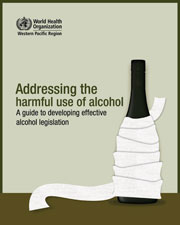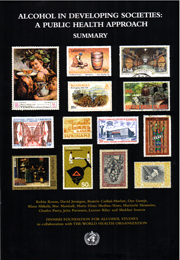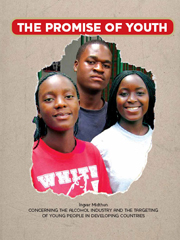
New alcohol policy in the making in Malawi
Malawi has embarked on a process to develop a new national alcohol policy. “The Malawian way” could well serve as a model for other countries!
One of the interesting features of the Malawian alcohol policy process is a series of consultation meetings with government agencies and civil society in various parts of the country. The third of these meetings was held on the 24th of September in the Chikhwawa District in the Southern part of Malawi, close to the border of Mozambique. Two more will be held later in 2010.
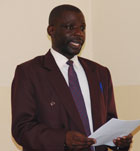
Local examples and stories
The first part of the consultation meeting in Chikhwawa allowed for statements from the local representatives. They were invited to describe how they experience alcohol-related problems in their communities. The headmaster of Livuzu Secondary School, Mrs P. Simbota (picture left), painted a picture of the so-called sachets as a problem for schools
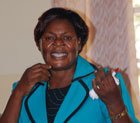
Senior Chief Chapananga and eight other traditional leaders also attended the meeting. Said Chief Chapananga: “Alcohol consumption definitely has a negative impact on our people in this region. We know that drinking is closely linked to problems like rape and gender-based violence”. He stressed that such problems can only be solved by dynamic leadership and therefore thanked the Task Force and Drug Fight Malawi for taking the lead in this. “ I welcome the draft document and totally agree with its content. I sincerely wish that the process will be brought to a successful end, resulting in a good policy document and then a new and updated legislation on alcohol in our country”. Another village headman told the meeting that “as I now speak at 11 o’clock in the morning, quite a number of men in my community are already heavily drunk”.
Alcohol regulations from the government!
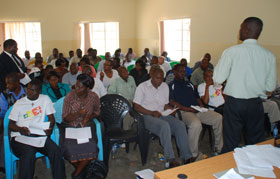
The document which is now being presented at the regional consultations in Malawi, National Alcohol Policy Draft 1, is a result of a two-year long process at national level. After a broad round of consultation in the initial phase, government institutions and national NGOs agreed to appoint a Task Force which could be responsible for a policy process and the drafting of a new national alcohol policy. The Ministry of Public Security and Internal Affairs has been appointed lead ministry for the process, and Drug Fight Malawi serves as a secretariat. The process is sponsored by the Norwegian development NGO FORUT, as part of its ADD program in Malawi; Alcohol, Drugs and Development.
A broad coalition
The Office of the President and Cabinet and the following ministries are members of the Alcohol Policy Task Force: Ministry of Health, Education, Women and Child Development, Industry and Trade, Youth, Local Government and then The Ministry of Internal Security. The national Police Headquarters also sits in the Task Force with one representative. Civil society is represented by some of the broad, national networks which work in areas related to alcohol policy; The Human Rights Consultative Committee, Malawi Network of AIDS Services Organization, The National Youth Council of Malawi, Civil Society Coalition for Quality Basic Education, Teachers Union of Malawi, Public Affairs Committee, Malawi Health Equity Network and the NGO-Gender Coordination Network.
A holistic approach
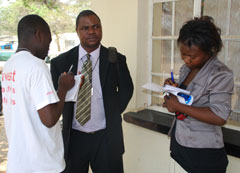
Based on discussions in the Task Force Committee the existing policy document has been drafted by consultant Mr. M. Kachiwiya. He presented an outline of the policy to the Chikhwawa meeting and said that the policy suggests interventions along two tracks; supply reduction and demand reduction. An effective policy to reduce alcohol-related harm must address both accessibility, availability, affordability and acceptability of alcohol in the Malawian society. He also said that the draft policy document concludes by suggesting institutional arrangements on the national level, in order to guarantee a concerted and sustainable implementation of alcohol policies in Malawi.
A unique process
At the end of the meeting Dag Endal, Project Coordinator for Malawi in FORUT was invited to share his reflections on the Malawian policy process, in view of FORUT’s experiences in other countries. Mr. Endal commended the Malawian government and NGO sector with the ambitious process they have embarked on. Said Endal: “Alcohol policy is now being discussed in many countries all over the world, not the least in many developing countries which experience that increasing alcohol consumption brings increased social problems. Alcohol-related harm becomes another stone to the burden for poor and underprivileged people”.
Endal reported that to FORUT’s knowledge there is not any other country which has started a policy process with the same quality as the Malawian one. “Your process is unique, Malawians are in the forefront and many countries should learn from your example. The ongoing alcohol policy process has a unique combination of critical qualities. It is knowledge-based, it is based on Malawian realities, it is open and inclusive and it is broad. All walks of life in Malawi have been given the opportunity to contribute, said the FORUT representative.
Related articles
![]()
![]()
Developed with CustomPublish CMS by Nettinfo AS

